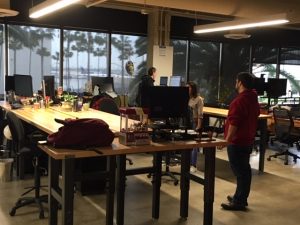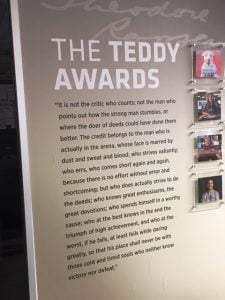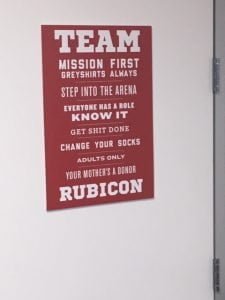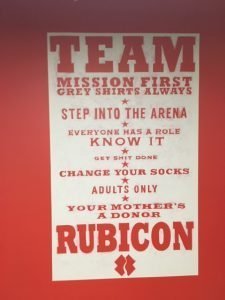Better Than Most is a regular feature of The Business of Giving, examining the best places to work among social good businesses and nonprofit organizations.
Denver: And for this edition, we’ll be going out to Los Angeles adjacent to LAX Airport and to the home of Team Rubicon. They utilize the skills and experiences of military veterans with first responders to rapidly deploy emergency response teams, and as you might expect, they have an exceptional organizational culture.
David: Something I think is unique about Team Rubicon’s culture is our employee culture really includes our volunteer base, and our volunteer base is about 90,000 people across the country. They’re really the embodiment of Team Rubicon’s mission and our ability to succeed. There’s not a single employee on the staff that stays very long without thinking about how their job affects our volunteers. One of the primary routes to includes volunteers is they have a constant voice in everything that they do in supporting the organization.Some of the questions about feedback mechanisms drove me to think about how we take feedback from our entire volunteer base and how we make that possible. We’re a paramilitary organization in some ways. So, we rely heavily on chain of command but we’ve also implemented processes that resemble a request store, an anonymous or jump the chain kind of feedback mechanism that is open to everyone, so they can say this is something I love that happened on this operation, and we can look for ways to include it more permanently or this is something that I think is a miss in this operation, and we’d like to see it corrected. Those channels are active both positive and negative and acted upon very quickly.
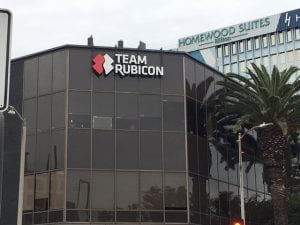 Chloe: Employees also really stay connected to the mission as well, and I think the way we do that is through engagement with volunteers in the field specifically. So, whether that’s deploying on an operation, or going out to a local service project…to an event or something, I think the way we stay so connected to the mission is by getting out and doing what everyone else is doing.
Chloe: Employees also really stay connected to the mission as well, and I think the way we do that is through engagement with volunteers in the field specifically. So, whether that’s deploying on an operation, or going out to a local service project…to an event or something, I think the way we stay so connected to the mission is by getting out and doing what everyone else is doing.
Victor: I would say 30 percent of my interview was based on the actual job itself, and once they got that out of the way, once I spoke to everybody, I felt like they were just trying to get to know me. Even after speaking with my manager afterwards, he made it clear to me that there were some people that they interviewed that were a little more qualified, had a little more experience. But they just felt that I was the best fit, and I thought that was great from the get- go. They just made me feel really at home right off the bat. I just haven’t gotten that anywhere else.
 Cinthia: It was a very thought-out interview. I felt like it was more like having a conversation. It didn’t feel like I was just interviewing for a job. I actually felt comfortable saying a lot of the things that I was saying based on my experience, so I think that was very unique and also just interviewing with… at the end of the interview, I had to interview with Jake and Arnie which is something that, it seems to be like the norm here, and I just… it was something new to me. It felt like, sometimes when you go to different companies, that’s not something that happens. You really don’t get to know the executives. I don’t even think sometimes they know who is it that’s coming on board, and I think that was very unique about Team Rubicon.
Cinthia: It was a very thought-out interview. I felt like it was more like having a conversation. It didn’t feel like I was just interviewing for a job. I actually felt comfortable saying a lot of the things that I was saying based on my experience, so I think that was very unique and also just interviewing with… at the end of the interview, I had to interview with Jake and Arnie which is something that, it seems to be like the norm here, and I just… it was something new to me. It felt like, sometimes when you go to different companies, that’s not something that happens. You really don’t get to know the executives. I don’t even think sometimes they know who is it that’s coming on board, and I think that was very unique about Team Rubicon.
Sarah: The other thing we’re implementing is this TRaveler. Basically, it’s going to be like a passport. It’ll be an employee’s go-to guide with absolutely everything they need. Whether that’s how to navigate our tech systems, or how to figure out each department. It’s going to be fill in the blanks. They’ll have a little description of the department; then you fill out all the org chart while you’re sitting through the overviews. Then it’s also going to have a little fun passport game with it. An example of some things that they’ll do is: they have to schedule a coffee hangout with one other person in Team Rubicon, and once they do that, they get a stamp. The whole idea is that they complete this passport, and that’s the official tying it all together – you’ve completed the People Ops portion of onboarding.
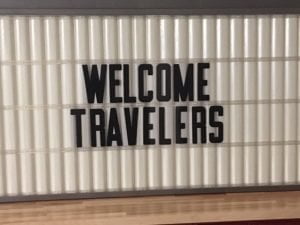 Scott: I had done a pretty hard career shift. This is my first job in Tech as a developer. So I came into this with impostor syndrome at the max. During my onboarding, Sarah, who was introducing me to the culture and everything just said, “Everyone has a role. Know it! We believe that you’re an expert at what you do.” For me, that was really validating.
Scott: I had done a pretty hard career shift. This is my first job in Tech as a developer. So I came into this with impostor syndrome at the max. During my onboarding, Sarah, who was introducing me to the culture and everything just said, “Everyone has a role. Know it! We believe that you’re an expert at what you do.” For me, that was really validating.
Andrew: Around Hurricane Harvey as well, we started what was now referred to as our open data initiative. It’s on our website, and that’s our commitment to actually just putting out there what we’re doing on large operations, what we’re doing every year, how many people we’re training, how many members we have, how much economic output we’re dealing with in terms of measuring it for either labor hours, or economic impact…what the value of our work would be if you were to treat it as a market. We put all these measurements onto the website, so that people can go and actually see what it is TR is doing, but also… we’re kind of pitching it from different angles.
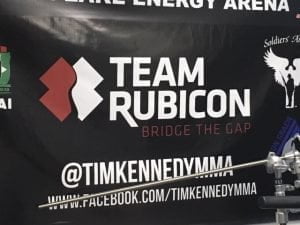 Scott: But I think that when I was hired on, siloing was a big issue. Every team had a different set of tools that they were using. Now, we are working with Microsoft and partnering with them to try and bring everyone into one ecosystem and connect everybody and help cross-functionality, help share data between teams, help the Capabilities Team work the Tech Team work with the Comms Team to deliver a unified service and a unified experience for anyone involved with Team Rubicon.
Scott: But I think that when I was hired on, siloing was a big issue. Every team had a different set of tools that they were using. Now, we are working with Microsoft and partnering with them to try and bring everyone into one ecosystem and connect everybody and help cross-functionality, help share data between teams, help the Capabilities Team work the Tech Team work with the Comms Team to deliver a unified service and a unified experience for anyone involved with Team Rubicon.
Cynthia: One of the things that has made me feel special being at Team Rubicon is that I have worked in a very corporate environment where literally, you’re just a person showing up to work. I felt that since I’ve been working here, I’ve noticed that a lot of executives do take the time to walk around and really greet you and remember certain facts about you. It’s very surprising that day after day or week after week is not like it’s something that they do the first week.
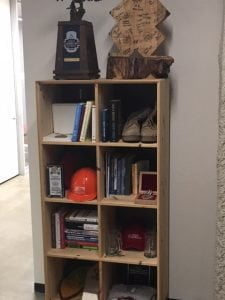 Sarah: Our goal by the end of your first day is that you walk away having a complete understanding of each of our cultural principles and how you fit into that. We have “Change Your Socks.” Change Your Socks is basically our way of reminding everyone that we make sure we’re at a hundred percent at all times, so that we can go help those who’ve been affected by disaster at a hundred percent. It actually kind of ties back to our military roots because it’s actually a military saying. It’s always one of those reminders where it’s like, Oh, Change your socks! Yes, we are a veteran organization, and we need to take care of ourselves as well.
Sarah: Our goal by the end of your first day is that you walk away having a complete understanding of each of our cultural principles and how you fit into that. We have “Change Your Socks.” Change Your Socks is basically our way of reminding everyone that we make sure we’re at a hundred percent at all times, so that we can go help those who’ve been affected by disaster at a hundred percent. It actually kind of ties back to our military roots because it’s actually a military saying. It’s always one of those reminders where it’s like, Oh, Change your socks! Yes, we are a veteran organization, and we need to take care of ourselves as well.
Chloe: My favorite cultural principle is “Adults Only.” It’s the idea about: We’re all adults here, and we should assume positive intent of one another in going into situations, with the idea you are expecting someone to act on the best interest of our Greyshirts, of the survivors that we are serving; that we respect one another as co-workers and that we’re willing to listen to what someone else has to say. I think that’s really important, and I think it’s what makes our organization so strong because a lot of people do hold that highly as a value.
Andrew: I have two favorite work values. I always think of them as a pair, and they are stepping into the arena and everyone has a role. I think those two, when you take them together is really interesting because stepping into the arena is kind of a friendly challenge to stretch your legs and actually try to do new things and put yourself out there in a really uncomfortable situation and then everyone has a role, but also give you the space to say, if you’re being pushed into something that you know that might not be comfortable with or you know you’re not good at, it gives you space to say, hey, this is not my forte. Either I need support in this or some training or we could get somebody else to help me deal with this because we’re always driven by the mission, so if you’re not performing, there’s a sense of you’re letting other people down in a very positive way. So, I think those two paired together are my two favorites.
Victor: About “stepping into the arena,” it’s one of my favorite cultural principles. I think it’s really easy to stand on the outside and pass judgement, especially nowadays where everything is on social media and transparent. Everybody’s got a voice. Everybody’s got a comment, something to say. It’s not easy to be that person to actually step in and take on that challenge and possibly fail. Most people are afraid to fail, so they just don’t try. I think that’s just great hearing most people are going with the expectation that they will succeed, but they know if they fall, there’s a good support group around them where they’ll help ‘em stand back up and jump back in it, rather than just stand on the outside and pass judgement.
David: The last one is your mother is a donor. I lobbied hard to get Jake to change it to your fixed income grandmother’s a donor. But the Comms Team said that was too wordy. I think it’s an excellent reminder that our money isn’t money that we’re generating profit. We’re not selling a product. We’re taking money that people expect good to be done with, and it reminds you how you spend every single dollar, and thinking about it from the context of your mother, family member just adds a little weight to that and it’s manifested well I think throughout the organization and sometimes to the effect that we have to actually remind people that we do have to spend money to do some of the work that we do. Give ’em one when we celebrate somebody on the team for something is literally everybody given one clap, and then let’s move on and get back to work. So, it’s a focus on, don’t ever miss a chance to recognize somebody but recognize that there’s shit ton of work to do. So, it’s an interesting approach to recognition.
Chloe: I think personal development can come in a lot of forms, but one way I’ve specifically seen it is by people taking the time to really invest in me, not necessarily going to a conference or taking an online course, but people really taking the time to go out of their way to give me advice or offer me reading material. For example, I just sat down with someone who wasn’t my direct manager and had a review with him which is an hour out of his time that’s really valuable but he was willing to collect some ideas and offer me feedback when that essentially isn’t in his job title. I think in that way, I’ve seen once again, as Cinthia has talked about a lot, is people care about you as an individual. You’re not just an employee here.
Scott: They develop you here by challenging you. They set something in front of you, a task or a challenge of some kind and once you accomplish it, they just don’t let that be the best or your function now. They’re going to keep pushing you and challenging you to do more and get better at what you do.
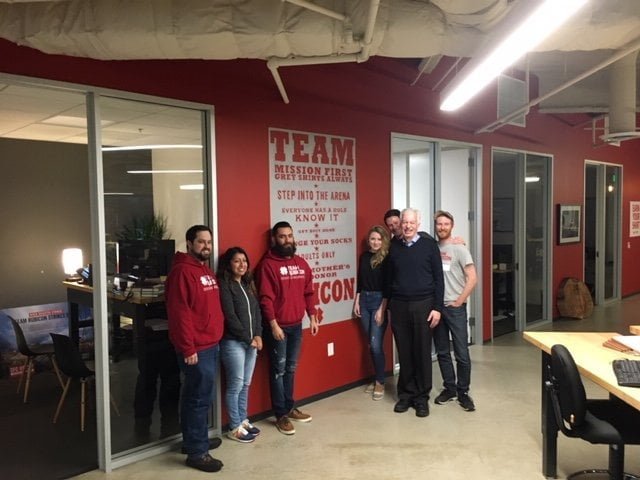
Denver: I would like to thank all those who participated in this piece: Sarah Hauke, David Burke, Chloe Hage, Andrew Glenn, Scott Marden, Victor Moran, and Cynthia Martinez. To hear this again, read the transcript or see pictures of the participants and the Team Rubicon offices, just come visit denver-frederick.com.
The Business of Giving can be heard every Sunday evening between 6:00 p.m. and 7:00 p.m. Eastern on AM 970 The Answer in New York and on iHeartRadio. You can follow us @bizofgive on Twitter, @bizofgive on Instagram and at http://www.facebook.com/BusinessOfGiving


